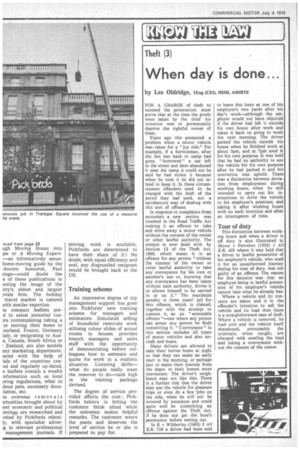When day is done...
Page 32

If you've noticed an error in this article please click here to report it so we can fix it.
by Les Oldridge, TEng (CE!), MIMI, AMIRTE FOR A CHARGE of theft to succeed the prosecution must prove that at the time the goods were taken by the thief his intention was to permanently deprive the rightful owner of them.
Years ago this presented a problem when a motor vehicle was taken for a "joy ride." For example, if a Serviceman, after the last bus back to camp had gone, " borrowed " a car left in the street and later abandoned it near the camp it could not be said he had stolen it because when he took it he did not intend to keep it. In these circumstances offenders used to be charged with the theft of the petrol they had used, not a satisfactory way of dealing with this sort of offence.
In response to complaints from motorists a new section was inserted in the Road Traffic Act making it an offence to take and drive away a motor vehicle without the consent of the owner or other lawful authority. The subject is now dealt with by Section 12 of the Theft Act, 1968, which states it is an offence for any person "without the consent of the owner or other lawful authority to take any conveyance for his own or another's use or, knowing that any conveyance has been taken without such authority, drives it or allows himself to be carried in or on it." The maximum penalty is three years' jail for this offence, which is classed, together with the attempt to commit it, as an " arrestable offence "—one where any person can arrest any person he finds committing it. " Conveyance " in this section includes all types of motor vehicles and also aircraft and boats.
Many drivers are allowed to take their lorries home at night so that they can make an early start in the morning, or perhaps just to make their journey from the depot to their homes more convenient. The driver's neighbours may not like this. There is a further risk that the driver may use the vehicle for pleasure trips or even do a few jobs on the side, when he will not be covered by insurance and could quite well be committing an offence against the Theft Act, if he does not get the boss's permission before setting out.
In R v Wibberley (1965) 3 AU E.R. 718 a driver had been told to leave this lorry at one of his employer's two yards after his day's work—although the employer would not have objected if the driver had left it outside his own house after work and taken it back on going to work the next morning. The driver parked the vehicle outside his house when he finished work at about 5pm, and at 7prn used it for his own purpose. It was held that he had no authority to use • the vehicle for his own purpose after he had parked it and his conviction was upheld. There was a distinction between deviation from employment during working hours, when he still intended to carry out his instructions to drive the vehicle to his employer's premises, and taking it after working hours with no such intention and after an interruption of time.
Tour of duty
This distinction between working hours and when a driver is off duty is also illustrated in Mowe v Parraton (1952) 1 AU E.R. 423 where it was held that a driver in lawful possession of his employer's vehicle, who used it for an unauthorised journey during his tour of duty, was not guilty of an offence. The reason for this decision was that an employee being in lawful possession of his employer's vehicle cannot take what he already has.
Where a vehicle and its contents are taken and it is the offender's intention to sell the vehicle and its load then there is a straightforward case of theft. Where a vehicle is removed, its load sold and the vehicle itself abandoned, presumably the criminals, when caught, are charged with stealing the load and taking a conveyance without the consent of the owner.




















































































